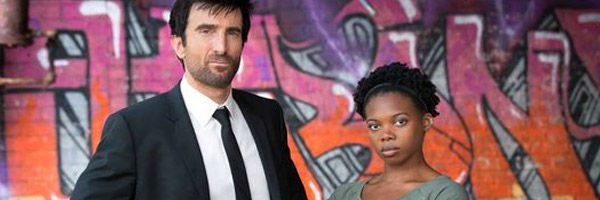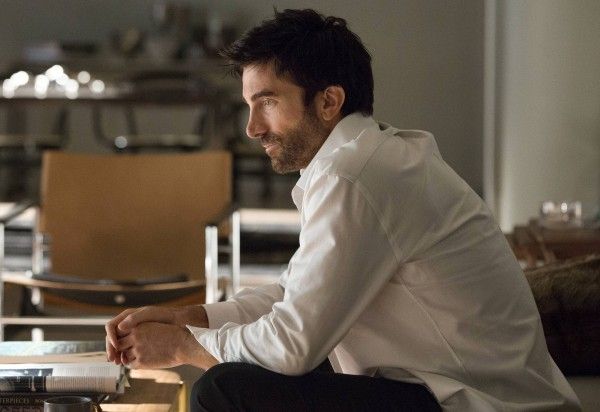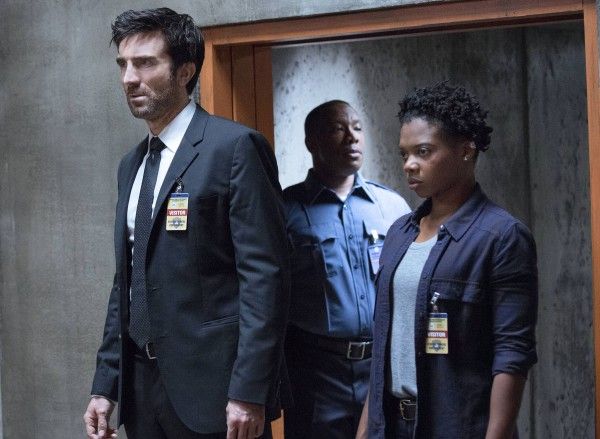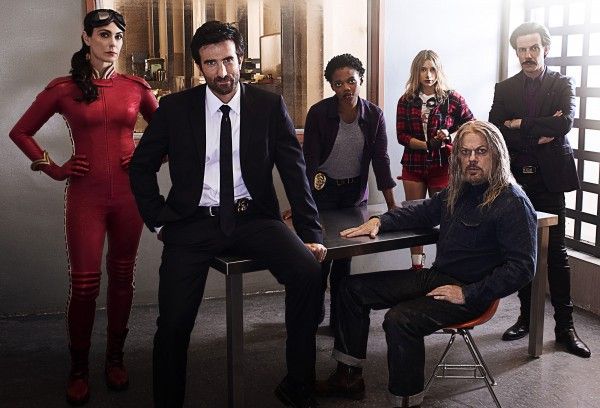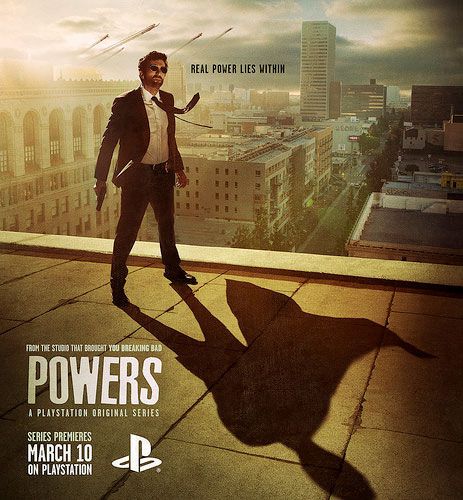To give some background: Brian Michael Bendis, a popular writer at Marvel Comics who has worked on books such as Ultimate Spider-Man, Avengers, X-Men, Guardians of the Galaxy and many more, started his career in comics with a number of independent books before digging deep into the Marvel Universe. One of these books was the gritty, noir-ish story of Powers, a police procedural that dove right into the idea of superheroes not only being real, but being larger-than-life pop stars who mostly cared more about their name in the paper than saving folks from a burning building. Powers, as a TV show, has been a dream of Bendis’ for quite some time, with the author stating it’s taken nearly 15 years to make his dream a reality. The closest the show came to happening before now was a Powers pilot for FX starring Jason Patric and Lucy Punch as Walker and Deena. Obviously, this pilot episode never made it, so the show was retooled and sold to the PlayStation Network (their first foray into scripted series) as part of their attempt to compete with Netflix and other streaming services. The dream has finally been made real, the show has been released, but the question remains, was it worth the wait? Well ...
I’m going to start this review with something that may very well determine whether or not you’ll stick with this show moving forward: the budget. Normally, a show’s budget isn’t necessarily something that’s going to stop one from enjoying the story that’s being presented to them. Take Doctor Who for example. The long-running BBC show has a cult following and never had the biggest of budgets to work with, usually vying to cut some creative corners in order to throw ideas like “the Weeping Angels” and “giant Dalek armadas” at the audience, while having these things still be believable in imaginative ways. In the case of Powers though, it’s a problem. You have to go into this show knowing that the budget just does not meet the weighty premise that the show presents to the audience, and it very well could have. Let’s look at an example from one of the earlier scenes in the series to give you a better idea of what I’m talking about here.
Walker, played by Sharlto Copley of District 9 and Elysium fame, finds himself waking up to start his day only to look outside and see a superhero brawl taking place in the sky above him. The now-fallen hero witnesses, as best as I can describe it, a cut scene from a 1995 PC game where three figures sort of clash against each other and awkwardly “jank” across the screen as a news reporter blares in the background. There had to have been a better way to do that. In fact, that statement should be the motto of the show, as there are just consistent missteps along the way from nearly every conceivable angle.
Delving into the characters themselves, Copley was always seen as something of an odd choice to play Detective Walker, who, in the comics, was a stoic mountain of a man with a kind heart. The show decided to take a much different approach than the comics, however, and decided instead to give Christian Walker the angle that he really misses the fame of being a superhero, and laments regularly about the powers he’s lost. In the right hands, this could have been a pretty compelling portrayal of a traditional “fall from grace” but here, it makes Walker just loathsome and unlikable. We’ve had plenty of characters who can be repugnant but for the life of us, we can’t take their eyes off them (Walter White, Stringer Bell, and Vic Mackey to name a few). Still, it can be a fine line to portray antiheroes in a compelling way to the viewers. Every time Copley is on screen, you kind of can’t wait for him to be gone so someone else can do more of the heavy lifting regarding the shows multiple, criss-crossing plotlines. He doesn’t bring anything compelling to the character, and there are clearly times when his accent is slipping, which begs question that if they were going to make Walker so different, why not just let Copley use his natural accent?
Susan Heyward as Deena Pilgrim (Walker’s partner), is sort of an amalgamation of two different characters from the comic series, acting as more of an exposition dump here than anything else. Again, not a bad decision in theory, but it’s almost as if they had to throw every aspect of both characters into this role, so Heyward seems to be jumping from personality to personality here to fit each scene, rather than an organic progression. On the antagonist side of things, Eddie Izzard as “The Wolfe” and Noah Taylor as Johnny Royale are two bright spots of the series who chew up their scenery with sorely needed flare (though Taylor’s gruff tone tends to be a bit grating after speaking for several sentences). I also particularly liked the portrayal of Michelle Forbes’ Retro Girl, a hardened veteran that once worked with Copley’s “Diamond.” You can tell exactly who her character is, and the weight of the responsibilities that are on her shoulders. In a particularly great moment, she explains to the young Calista how she gave up fighting criminals to save people, and it’s believable. Still, scenes like this are few and far between.
Speaking to the plot, as I mentioned earlier, a lot has been changed from the original comic book for this televised adaptation. Characters have been significantly altered and plotlines have been mashed together, seemingly covering a number of the comic’s first storylines. However, the show can’t seem to decide on a central theme, and will dart arond without taking time to figure out what it wants to be. For example, Walker’s partner is killed by an apprehended “Power,” and instead of dealing with Walker’s guilt and struggle with this, we’re thrown into an Extra report from Mario Lopez. Yes, AC Slater arrives on the scene to deliver us into the world of Powers in a really jilted manner, showing footage from the police station of Walker’s partner having his head caved in. I can understand the idea of introducing the concept of celebrity and status right from the start, but its just done so poorly, and heavy handedly, that it was groan inducing. This leads to the introduction of Pilgrim, where Walker’s partner’s brains are strewn across the walls of the precinct, and Deena justifiably asks, “Uhhh, shouldn’t someone clean that up?”
“No, I wanted you to see it.” replies the police chief. Very respectful to your fallen brother at arms there, chief. It’s just another example of a story beat that could have been handled far better than it was (to say nothing of Walker being introduced to Pilgrim, holding his partner’s shoes and literally saying, “big shoes.”) Speaking of shoes, the show never really seems to find its footing, and on top of the budgetary problems and the unlikeable characters, it was something of a chore to slog through these first three episodes. This isn’t to say there isn’t a glimmer of hope here and there. I thought the end of the pilot episode with Walker attempting to talk down Calista from the rooftop was pretty good. It demonstrated what the show has been trying so hard to do, and failed at so many times: setting up a world of superheroes, and the danger of lusting for status and popularity. The thing of it is, if you’re going to have the key theme be popularity and bigger-than-life ideas, you’d should really be bigger-than-life in your appearance. Cutting to hopping nightclubs that are essentially just big empty warehouses where they could hardly care to hire enough extras to populate the red carpet does not do the job.
We live in an interesting time when it comes to comics. Comic book stories and characters are populating nearly every form of media, so there are plenty of choices when it comes to movies and TV that deal with certain themes. While Powers has an interesting hook, it just doesn’t ever reach a level where I can recommend it for people to watch. Give this one a pass.
Rating: ★ Poor — A waste of time
Power Plays:
- The budget. I just can’t mention it enough. Everything seems so small and it genuinely affects your ability to buy into the world. When you have the heroes in costume look just as abysmal as the rookies who are attempting to emulate them, it hurts.
- It’s such a shame that the dialogue isn’t better here as Brian Michael Bendis’ number one strength is really his ability to create snappy banter between characters. The chemistry between so many of the actors being practically nil probably has a hand to play in this.
- Johnny Royale’s powers of teleportation are interesting, but again, the budget can’t portray them to what they were most assuredly going for. Look at the scene where Johnny teleports a victim’s head clean off and the body is horribly green-screened, or when Johnny is teleporting across the dance floor of his club and you can practically see the disconnect between him and the other folks dancing.
- I don’t think I’ve ever heard characters say “fuck” as much in a show than in episode three at the nightclub. I think it may have even beat the The Wire’s use of curse words during the legendary crime scene exchange between Bunk and McNulty.
- One of the scenes that was straight from the comics was one of the best, wherein Walker and Deena interview the wife of the now dead Olympia. This is something that should have gotten a lot more screen time, as you can hear the sincerity in the voice of the new widow. It’s a scene that works well and again, does so much more to push forward the theme of the show than anything else.

